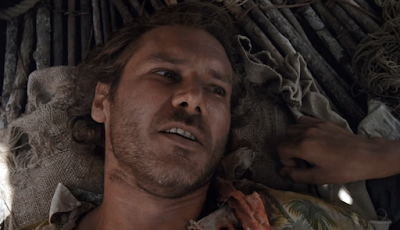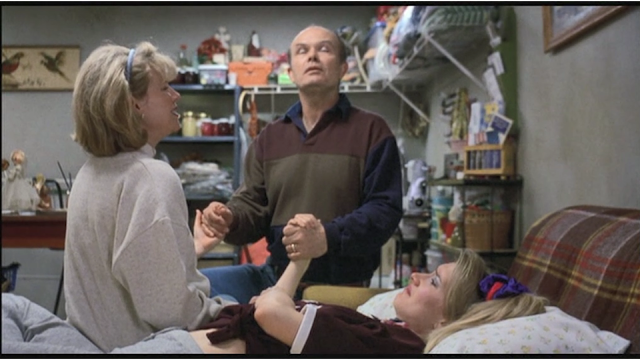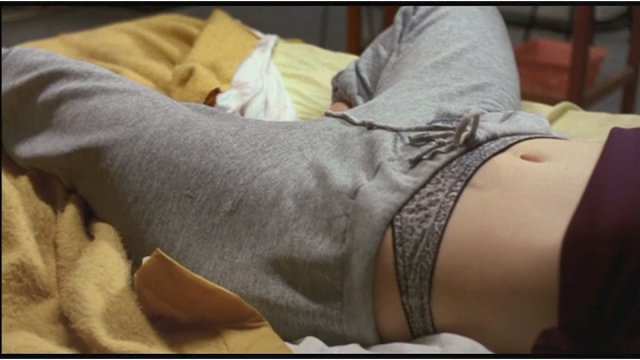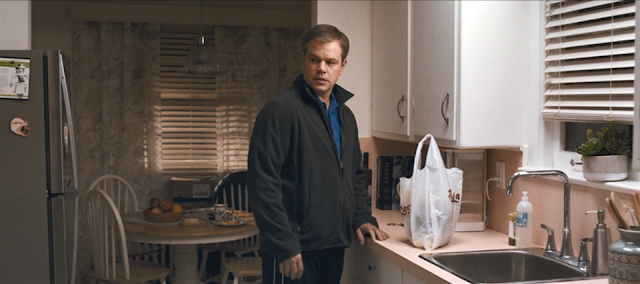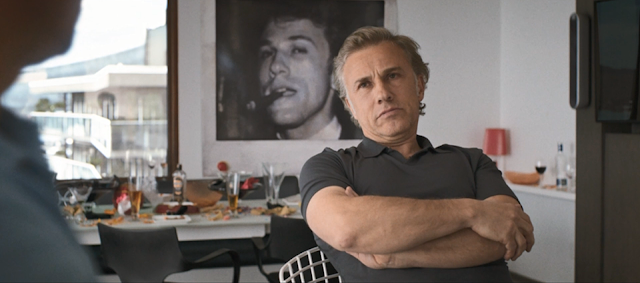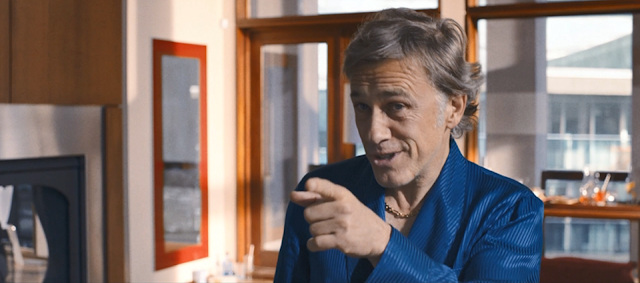"A reasonable man adapts to the world. Unreasonable one tries to adapt the world to himself. Therefore, progress always depends on unreasonable ones." - George Bernard Shaw
In Part One, I covered the broad theme of explorers driven
to find new worlds and establish their visions of Utopia. Every individual has their own ideas of
Utopia so therefore this never works as is the case of Allie Fox in The
Mosquito Coast.
Now let’s focus in on Allie Fox himself. I bet anybody who has seen this movie came
out of it with a strong opinion of him. He
has a strong personality. He looks like
an ordinary fellow, but we just can’t help noticing his self-confidence and
belief in openly sharing his ideas to anybody within earshot. I’ll admit right now that I think Allie Fox
is a fascinating character. Is he the
way he is just because he wants to be different? How much of what he says is truly what he
believes and how much is just to get his way?
Who is Allie Fox?
I’ll go over some of the same points as part 1, but only
because they fit these points as well.
Allie thinks of himself as “The Last Man”, the one who will
save civilization, the last one who knows how.
Allie’s son Charlie thinks of his father as a “genius”. He listens to Allie rant on and soaks it all
in. Charlie is the eldest son and is
clearly Allie’s favorite child. Charlie
is the apparent heir of Allie’s genius.
Jerry is Allie’s second son.
He’s always unsure of his father, his visions, and his intentions. He’s not the believer Charlie is and is
therefore mostly ignored by Allie.
I have to point out that this story is being told from the
perspective of Charlie. Charlie, being
very much like his father is misogynistic.
We never learn his mother’s name.
She is just referred to as “Mother” – her sole role in the family and
the movie. The same goes for the twin
daughters. They are referred to
as “April” and “Clover” in the closing credits, but I don’t believe that either
one is called by name during the movie. They
hardly matter in Charlie’s narrative.
Charlie with his bias towards his father, is not an entirely credible
narrator.
So what do “Mother” and the daughters think of Allie? It doesn’t matter and they all seem very
accepting of this. “Mother” is happy
when Allie is happy.
Most people outside the family who know Allie think he’s the
town nut.
Reverend Spellgood seems to think Allie is a false prophet,
or perhaps even the devil who poisons the ears of those who listen.
When Allie brought civilization in the form of farming,
organized housing, and finally ice and air conditioning to a village in the
Belize jungle, the indigenous people there thought he was a god. Deep down inside, this is what Allie wanted
all along. For an all too short period,
all was well with Allie when his vision appeared to come to reality and it was
all due to him.
Which basically makes Allie a megalomaniac. He has a God complex.
Allie talks and talks and talks. He hears only himself and this conditions him
into believing he is a god.
Allie can create a person a.k.a. “Fatboy”.
“The Earth’s bellybutton”. Allie’s position is that he can control even
the Earth. The Earth has human parts
like “Fatboy”.
Even Mr. Polski’s employees call Allie “Father”.
"He’s my father too!”
The Bible doesn’t work. Allie feels he can make this judgment.
Allie wants the wheel.
The need for control.
Allie gets his way. He takes the wheel as if it’s his boat later on.
Allie and Spellgood argue. Allie lambasts his “lack of presumption”. He also speaks as if he replaced God – “he didn’t, I did!”
The family being excited to go “home” means loss of
control to Allie. Notice how he regains
his control. He uses fear as a tool to
control. He tells his family America
doesn’t exist anymore.
In order to perpetuate his own delusion that he is a god, Allie
feeds his megalomania by turning negative situations positive with the tool of
rationalization.
Mr. Polski rejects ‘Fatboy’. Allie is disappointed at first, but then
tells his boys that it’s a good thing.
Jeronimo is obviously not what Allie expected, but he
tells his family it’s perfect.
Allie even rationalizes the destruction of Jeronimo.
“An Ordeal is a Square Deal”. That’s an interesting quote. Who said it? Theodore Roosevelt? Or is that
Allie’s?
With yet another disaster happening and all seeming to be lost again, we get “I’ve got control!” as Allie quickly regains his confidence with the found spark plugs and gasoline. We know this is false because the plugs and gas came from Mr. Haddi and Charlie. Allie did not have control.
“I’m doing this for all of us. I’m doing this for you.” More rationalization.
“Beautiful country, eh Mother.” Allie goes back to thinking he can make
everything right.
Allie’s most human moments are when the 3 mercenaries take
over. He even admits he made a mistake.
Spellgood and his own God-complex.
Does Spellgood see the people of Jeronimo as “Israel”
meaning slaves? Allie notes the barbed
wire around his property and calls it a “Christian Concentration Camp”. Spellgood’s upset that “his people” forsook
him for Allie.
Spellgood’s beliefs are opposite of Allie’s. Spellgood
sees life as a burden where one must accept one’s place in it and
endure. Spellgood is just the man to
give comfort to the people that God will ease their burdens. Allie believes that problems in life are
there to be fixed. Allie is the man up
to the task. Both men are megalomaniacs.
When Allie confronts Spellgood, whom he sees as a foe, the
camera angle depicts him like a gunfighter fingering his hammer as if he’s
about to be in a quickdraw.
I find the blue and yellow clothing interesting. Notice how almost everybody wears blue and/or yellow except Allie and Charlie, who mostly wear tan and green. They see themselves as separate from the others. Even Spellgood and two men with them are in yellow or blue. Mother wears white with a blue kerchief. Looks like she’s a bit in between.
Just as Allie’s temple burned in a raging inferno, so did Spellgood’s. The burning tower resembles “Fatboy” burning.
Omens/Foreshadowing
Throughout the movie, there are little clues or omens that
betray the thought that all is right with Allie and his visions.
Polski outright warns Charlie and Jerry that their father is
dangerous.
Shadows creeping. A
broken down ancient temple. I mentioned
these in part 1.
Upside-down pyramid on “FatBoy” counters the idea that Allie
and “Fatboy” are at the top of things.
Allie get angry when Jerry doesn’t show the awe everyone else does.
Allie’s watch is an “Omega” meaning the end.
Raft looks like a fish skeleton. Raft of death.
Tyrant at the end. You think of socialist “utopias” that quickly turned into tyrannies – USSR, China, Cuba.
Allie realizes he’s just a man at the end.
It’s hard to think of it this way, but the world needs its Allie Foxes. It needs people who do what everyone else think is crazy. It’s those like Fox who wake people up and ultimately inspire others. Progress doesn’t come institutionally from governments or corporations; it comes from risk-takers with self-serving motives.















